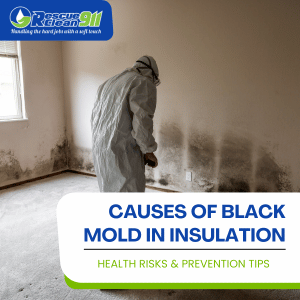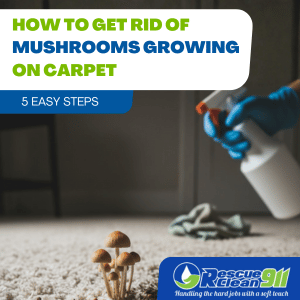Knowing how to detect mold in walls is essential for maintaining a healthy home. Mold growth often begins in hidden areas, such as behind drywall or under bathroom tiles, and can pose significant health risks if left untreated.
Detecting mold early prevents structural damage, minimizes remediation costs, and protects your family from the health effects of mold exposure.
Mold spores are virtually everywhere, landing on walls, ceilings, and building materials. Under the right conditions—warmth, moisture, and organic material—these spores can initiate mold growth, resulting in visible or hidden mold problems in your home.
Understanding the signs, causes, and prevention strategies is crucial for effective mold cleanup and long-term protection.
How to Detect Mold in Walls: Signs, Methods, and Prevention
Detecting mold in walls requires a careful combination of observation, testing, and preventive measures. Mold thrives in damp environments, particularly where condensation occurs or moisture problems persist.
Whether you notice peeling wallpaper, water stains, or a musty odor, these could all be early indicators of indoor mold growth.
Understanding Mold Growth and Mold Spores
Molds are fungi that reproduce through tiny spores that are often invisible to the naked eye. These spores land on damp surfaces containing organic material, such as wood, drywall, or ceiling tiles, and begin to grow.
When humidity levels exceed 55%-60%, mold growth accelerates, often unnoticed behind walls, under flooring, or inside air ducts. Airborne mold can travel through indoor air, spreading the problem to multiple rooms.
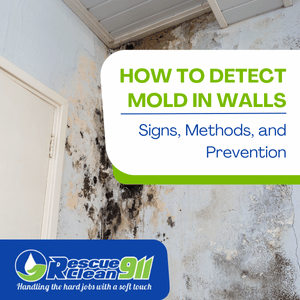 Mold species vary in toxicity, and some types, referred to as toxic mold, can produce allergens or irritants that pose serious health concerns.
Mold species vary in toxicity, and some types, referred to as toxic mold, can produce allergens or irritants that pose serious health concerns.
Individuals with a compromised immune system, asthma, or allergies are especially vulnerable to the health effects of mold exposure. Even short-term exposure may trigger coughing, a runny nose, skin rashes, or more severe reactions.
Common Causes of Indoor Mold Growth
Mold growth is rarely random; it typically appears where moisture accumulates. Common sources of moisture include:
Water leaks from roofs, plumbing, or walls.
Condensation on windows, ceilings, or walls.
High humidity levels, particularly in bathrooms or basements.
Poor ventilation, such as in attics, crawlspaces, or HVAC systems.
Dead organic matter, like dust, plants, or wood, that remains damp.
Left unchecked, these moisture problems can lead to extensive mold damage, compromising building materials such as drywall, ceiling tiles, and porous materials like wood or insulation.
Find out how to get rid of mold in your insulation.
Signs and Symptoms of Mold Issues in Walls
Detecting a mold problem often begins with visual or sensory clues. Common signs include:
Visible mold growth: fuzzy, slimy, or discolored patches on walls, ceilings, or bathroom tiles.
Musty odors that linger even after cleaning.
Water stains or warping of walls, ceilings, or drywall.
Damp surfaces or walls that feel wet to the touch.
Unexplained health problems, including asthma attacks, coughing, or a runny nose.
Even if mold is hidden, these signs can indicate a moisture problem that could foster mold growing inside the walls.
Identifying Mold: Tools, Techniques, and Professional Testing
Identifying mold correctly is key to safe remediation. Mold can appear in a range of colors—black, green, pink, or red—and even toxic mold may exist in areas that are initially hidden. Effective identification involves:
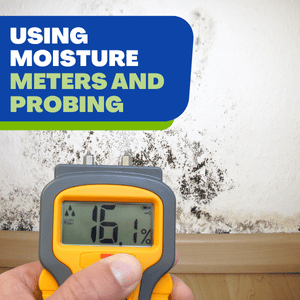 Using Moisture Meters and Probing
Using Moisture Meters and Probing
A moisture meter is one of the most effective tools for detecting damp areas behind walls or under flooring. By measuring moisture content, homeowners can pinpoint areas where mold may be growing. Probing suspect areas with a screwdriver can also reveal whether mold damage or wood rot has occurred.
DIY Mold Test Kits
DIY kits often use Petri dishes to collect spores from the air. These kits are best used in moisture-prone areas, such as bathrooms or near water leaks. While they can indicate the presence of airborne mold, results are less accurate than professional methods.
Professional Mold Testing
Professional mold testing is more accurate and involves air samples, surface testing, and sometimes laboratory analysis to determine the type and concentration of mold spores.
Certified inspectors can identify mold species, hidden mold, and potential risks to occupants. They also advise on proper containment and mold remediation techniques.
Effective Methods for Mold Cleanup and Remediation
The approach to removing mold depends on the size and location of the affected area:
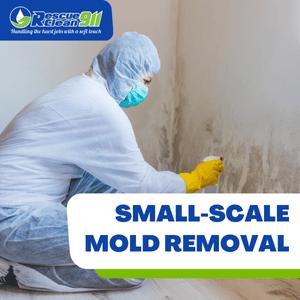 Small-Scale Mold Removal
Small-Scale Mold Removal
For areas less than 10 square feet, homeowners can often handle mold cleanup themselves. Recommended steps include:
Wear personal protective equipment (PPE), such as gloves, masks, and goggles.
Scrub mold from hard surfaces using appropriate cleaning solutions.
Remove moldy surfaces, such as damaged drywall, ceiling tiles, or porous materials.
Avoid using bleach, as it is often ineffective against mold inside porous materials.
Professional Mold Remediation
For larger infestations or toxic mold, professional mold remediation is necessary. Experts use:
Proper containment to prevent spores from spreading.
Specialized mold removal techniques for contaminated building materials.
Continuous monitoring of humidity levels and air quality.
Inappropriate methods, like painting over mold, can worsen the problem. Proper disease control involves mold cleanup and eliminating underlying moisture sources.
Preventing Mold Growth in Your Homes’ Walls
Prevention is always better than remediation. Key strategies to prevent mold growth include:
Fix all water leaks promptly in roofs, walls, and plumbing.
Maintain indoor humidity below 60% by using dehumidifiers as necessary.
Install exhaust fans in kitchens, bathrooms, and laundry rooms.
Ensure proper airflow in basements, attics, and air ducts.
Inspect HVAC systems, air conditioners, and heating systems regularly.
Avoid storing dead organic matter in damp areas.
Use moisture-resistant building materials in areas prone to dampness.
Regular inspections can help catch hidden mold before it becomes a serious problem, reducing the need for costly mold remediation later.
You can check our blog about what to do when you find mold in your attic.
Special Considerations and Health Impacts
Health Concerns of Mold Exposure
Indoor mold growth can trigger a variety of health problems. Symptoms may include:
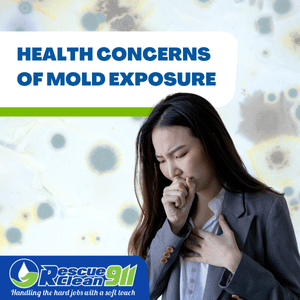 Respiratory issues, like asthma attacks or persistent coughing.
Respiratory issues, like asthma attacks or persistent coughing.Allergic reactions, such as a runny nose or skin rashes.
Fatigue, headaches, or sinus congestion.
Individuals with a compromised immune system are particularly at risk. Children, the elderly, and pets may also suffer from the health effects of prolonged exposure.
Occupational Safety for Mold Cleanup
Professionals handling large-scale mold problems follow occupational safety guidelines to protect against airborne mold. They use personal protective equipment (PPE), proper containment, and specialized techniques to ensure safe mold removal.
Understanding Mold Species and Toxic Mold
Some mold species produce mycotoxins that can be harmful even in small concentrations. Toxic mold infestations require professional intervention, as improper remediation can worsen indoor air quality.
Preventing Hidden Mold and Long-Term Damage
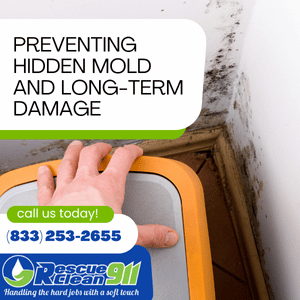 Hidden mold can lurk behind drywall, ceiling tiles, and porous materials for months before becoming visible. To prevent mold growth in these areas:
Hidden mold can lurk behind drywall, ceiling tiles, and porous materials for months before becoming visible. To prevent mold growth in these areas:
Monitor for musty odors and unexplained water stains.
Repair leaks in walls, roofs, and plumbing immediately.
Ensure proper ventilation in bathrooms, kitchens, and basements.
Use dehumidifiers in damp spaces to maintain humidity below 60%.
Inspect areas prone to condensation, like windows, walls, and air conditioners.
Neglecting these steps can lead to mold damage and costly remediation. Regular inspections can prevent mold issues from escalating.
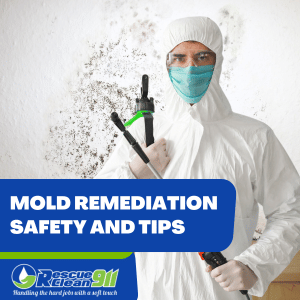 Mold Remediation Safety and Tips
Mold Remediation Safety and Tips
When tackling mold, safety is paramount. Consider:
Wearing personal protective equipment to prevent mold exposure.
Avoid using bleach on porous materials—use cleaners specifically designed for mold removal.
Use proper containment to prevent spores from spreading during mold cleanup.
Cleaning moldy areas on hard surfaces immediately to prevent mold from reproducing.
For large infestations, hire certified professionals who follow occupational safety guidelines and EPA recommendations.
Protecting Your Home and Health
Mold is a pervasive problem in homes that suffer from moisture problems. Detecting it early is essential for protecting both the building and its occupants. Signs like visible mold growth, musty odors, damp walls, and water-stained drywall are all indicators of a potential mold issue.
Proper mold remediation, including safe removal and scrubbing mold from hard surfaces, along with preventive practices such as fixing leaks, ventilating spaces, and monitoring air quality, ensures that your home remains safe, dry, and free from harmful mold spores.
The team at Rescue Clean 911 provides mold remediation in South Florida. We identify the cause of mold growth in your wall, clean all affected surfaces, and help you make changes that will prevent mold from growing back.
For any homeowner concerned about health problems, structural damage, or persistent dampness, understanding how to detect mold in walls is the first and most important step toward a healthier, safer home.
Frequently Asked Questions
Yes. The most common signs are a persistent, musty smell and visual damage like peeling paint or bulging drywall. Professionals use moisture meters and thermal cameras to find hidden moisture, which is the root cause.
The first visible signs are often small, fuzzy, or slimy spots (which can be any color), discoloration, or paint/wallpaper that is peeling or bubbling. A musty odor is usually noticeable early on as well.
Indirectly, yes. Moisture meters and thermal imaging cameras detect the excessive moisture needed for mold to grow. A borescope (a small camera) can be inserted into the wall cavity for direct visual inspection.
Early signs of mold exposure often resemble allergies or a cold: persistent sneezing, runny nose, itchy eyes, coughing, or wheezing. Headaches and fatigue that improve when you leave the building are also common indicators.

